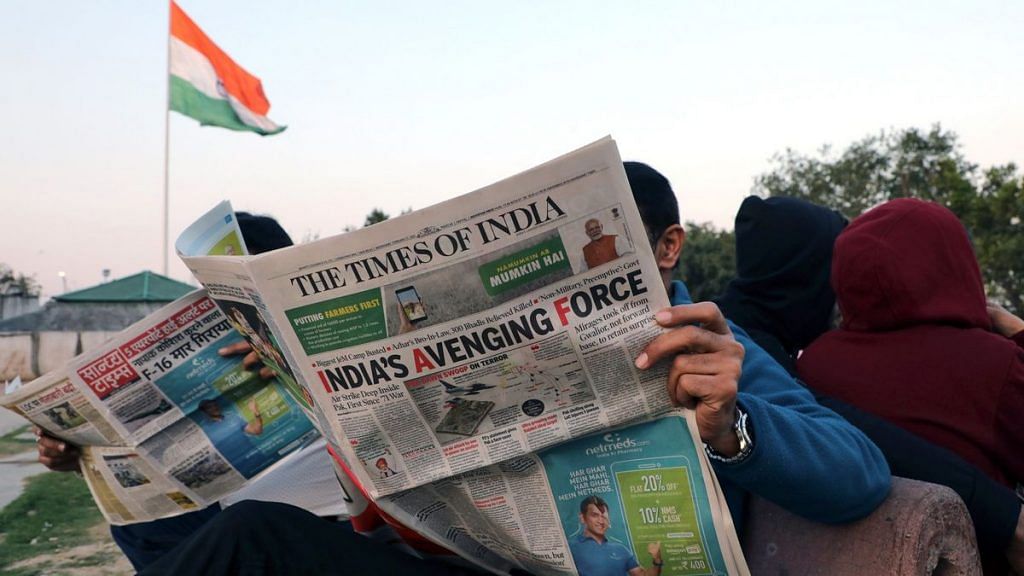New Delhi: The Narendra Modi government has set up a committee that will work on improving India’s ranking on the freedom of press index.
Paris-based Reporters Without Borders (RSF) has recently ranked India 142nd among 180 countries on the World Press Freedom Index 2020.
Government sources, however, told ThePrint that the decision to set up the panel, the Index Monitoring Cell, was taken around a month ago, even before the latest rankings were released on 22 April.
The decision, the sources added, was taken as India’s rankings had been slipping over the past two years. India was ranked 140 in 2019, and 138 in 2018 on the press freedom index.
The Index Monitoring Cell will function under the aegis of the Ministry of Information and Broadcasting. It is the latest effort by the Modi government to improve the country’s rankings on various global indicators across sectors.
In March, the government had put out a directive that as many as 32 selected global indices, including the World Press Freedom Index by RSF, will be tracked by Niti Aayog to drive reforms and growth.
The Global Terrorism Index (GTI) rankings by the Australia-based Institute for Economics and Peace (IEP) is also part of the list. Its methodology was recently questioned by Niti Aayog.
Also read: Job losses, pay cuts, editions shut — coronavirus triggers new crisis for Indian media
The task for the panel
Highly-placed sources in the government told ThePrint that the government’s new panel will have representatives from the government and from among journalists.
The Index Monitoring Cell will be chaired by the principal director general of the Press Information Bureau and will have representatives from the ministries of I&B, External Affairs, Niti Aayog and a set of “credible journalists of repute”, according to the sources.
They added that the names of the journalists will be suggested by the media watchdog Press Council of India, but the final approval will come from the I&B ministry.
A senior government official privy to the matter said the cell would study the parameters on which the World Press Freedom Index is calculated so as to take adequate action on them and also create adequate awareness in other ministries about the index.
“The cell will also coordinate with other ministries so that they can be taken on board while formulating an action plan and keep a tab on the progress on them,” the officer said.
The cell will also steer informal and formal engagements with all stakeholders involved in the index, which could be other ministries or media houses.
Also read: Home ministry can withdraw security clearance to TV channels under new draft guidelines
Cell to keep an eye on states
The cell will also keep a tab on the performance of states and union territories on those parameters and report on that to other relevant ministries and Niti Aayog, particularly its newly created media outreach department and its project monitoring unit for monitoring of the progress in this regard.
Another source from the PCI, who is privy to the matter, told ThePrint that the cell will regularly keep all stakeholders updated about the progress on the parameters.
“The cell will also establish platforms to ensure that the actions taken by the government in improving India’s position on the index gets maximum visibility,” the source said.
ThePrint has learnt that states and UTs will also compete and be ranked on press freedom and the cell will oversee and monitor the process.
Stating that improved rankings in such indices will help boost the country’s global image and attract opportunities, a second government official said that there would be efforts by the cell to coordinate with data publishing agencies on these parameters.
“The IMC will also set up proper reporting mechanisms so that the data is up to date,” the second officer said.
Also read: Ramayan, Bigg Boss reruns keep viewers hooked, but lockdown is bleeding TV of crores a day
Slipping rankings
In the latest World Press Freedom Index, India features in the red category, just above Pakistan (145) but way below neighbours such as Bhutan (67), Nepal (112) and Sri Lanka (127) are all ranked higher in the index.
In its accompanying report, the RSF has said that while India did not see any murder of journalists in 2019, there have been “constant press freedom violations, including police violence against journalists, ambushes by political activists, and reprisals instigated by criminal groups or corrupt local officials”.
“Ever since the general elections in the spring of 2019, won overwhelmingly by Prime Minister Narendra Modi’s Bharatiya Janata Party, pressure on the media to toe the Hindu nationalist government’s line has increased,” the RSF said.
India has faced criticism on dipping press freedom from other global bodies as well. Last year, the United States-based Committee to Protect Journalists (CPJ) placed India, along with 13 other countries, on the Global Impunity Index 2018, a ranking for the worst records of prosecuting the killers of journalists.
The Modi government, however, has publicly slammed the rankings.
On 3 May, observed as the World Press Freedom Day, I&B minister Prakash Javadekar took an apparent dig at the RSF index, saying the media has the power to inform and enlighten people and that the media in India enjoy absolute freedom.
“We will expose, sooner than later, those surveys that tend to portray bad picture about “Freedom of Press” in India,” he tweeted.
Media has the power to inform and enlighten people. Media in India enjoy absolute freedom. We will expose, sooner than later, those surveys that tend to portray bad picture about "Freedom of Press" in India.#WorldPressFreedomDay
— Prakash Javadekar (@PrakashJavdekar) May 3, 2020
